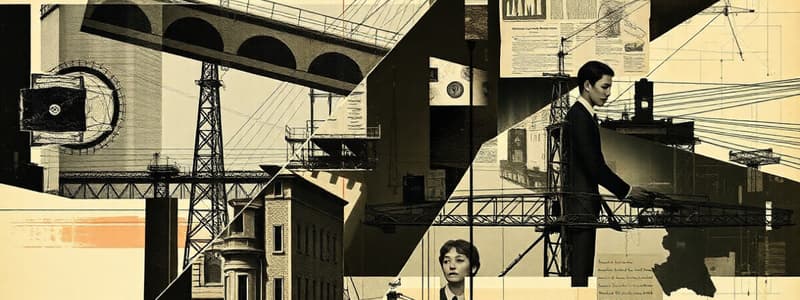Podcast
Questions and Answers
What does Euler's formula primarily address in relation to columns?
What does Euler's formula primarily address in relation to columns?
- The safe load on a column under varying environmental conditions
- The relationship between stress and strain in materials
- The critical load and buckling of columns with hinged ends (correct)
- The effect of lateral forces on structural integrity
Which parameter is essential for determining the equivalent length of a column?
Which parameter is essential for determining the equivalent length of a column?
- End conditions of the column (correct)
- Cross-sectional area
- Material elasticity
- Length of the column
Rankine's formula incorporates which primary factors when calculating the safe load on a column?
Rankine's formula incorporates which primary factors when calculating the safe load on a column?
- Material density and cross-sectional shape
- Critical load and short column effects
- Elastic modulus and column dimensions
- Length, moment of inertia, and load type (correct)
In eccentrically loaded columns, which type of stresses must be analyzed?
In eccentrically loaded columns, which type of stresses must be analyzed?
What does the concept of critical load refer to in the context of column stability?
What does the concept of critical load refer to in the context of column stability?
What is the primary purpose of constructing shear force and bending moment diagrams for beams?
What is the primary purpose of constructing shear force and bending moment diagrams for beams?
Which aspect is critical in understanding column behavior?
Which aspect is critical in understanding column behavior?
What does critical load determination in columns involve?
What does critical load determination in columns involve?
The flexure formula is primarily used to calculate which of the following?
The flexure formula is primarily used to calculate which of the following?
What is one implication of eccentric loading on a column?
What is one implication of eccentric loading on a column?
In the analysis of shear force and bending moment diagrams, which factor is least likely to be affected?
In the analysis of shear force and bending moment diagrams, which factor is least likely to be affected?
Which method is essential when determining the axial and eccentric loading effects on columns?
Which method is essential when determining the axial and eccentric loading effects on columns?
What does the mastery of shear force and bending moment diagrams help engineers accomplish?
What does the mastery of shear force and bending moment diagrams help engineers accomplish?
What is the primary assumption made in the theory of simple bending?
What is the primary assumption made in the theory of simple bending?
Which of the following correctly represents the flexure formula for bending stress?
Which of the following correctly represents the flexure formula for bending stress?
What is the effect of a uniformly distributed load on the bending moment diagram of a simply supported beam?
What is the effect of a uniformly distributed load on the bending moment diagram of a simply supported beam?
In the context of shear stresses in beams, what does the shear stress formula derive from?
In the context of shear stresses in beams, what does the shear stress formula derive from?
What are the characteristics of the maximum shear stress distribution in a rectangular cross-section beam?
What are the characteristics of the maximum shear stress distribution in a rectangular cross-section beam?
In the derivation of the flexure formula, what does 'I' in the formula σ = My/I represent?
In the derivation of the flexure formula, what does 'I' in the formula σ = My/I represent?
Which of the following factors does NOT directly influence the buckling load of a column?
Which of the following factors does NOT directly influence the buckling load of a column?
What is typically assumed about a beam when analyzing bending stresses?
What is typically assumed about a beam when analyzing bending stresses?
Flashcards
Critical Load
Critical Load
The minimum axial load that causes a column to buckle.
Euler's Formula
Euler's Formula
A formula to calculate the buckling load of a column with hinged ends.
Equivalent Length
Equivalent Length
An adjusted length of a column to account for different end conditions during buckling analysis.
Eccentrically Loaded Column
Eccentrically Loaded Column
Signup and view all the flashcards
Rankine's Formula
Rankine's Formula
Signup and view all the flashcards
Shear Force Diagram
Shear Force Diagram
Signup and view all the flashcards
Bending Moment Diagram
Bending Moment Diagram
Signup and view all the flashcards
Internal Forces in Beams
Internal Forces in Beams
Signup and view all the flashcards
Column Critical Load
Column Critical Load
Signup and view all the flashcards
Column Behavior
Column Behavior
Signup and view all the flashcards
Axial Loading
Axial Loading
Signup and view all the flashcards
Eccentric Loading
Eccentric Loading
Signup and view all the flashcards
Competent Construction
Competent Construction
Signup and view all the flashcards
Shear Force & Bending Moment
Shear Force & Bending Moment
Signup and view all the flashcards
Shear Stress Formula
Shear Stress Formula
Signup and view all the flashcards
Flexure Formula
Flexure Formula
Signup and view all the flashcards
Shear Stresses in Beams
Shear Stresses in Beams
Signup and view all the flashcards
Bending Stresses in Beams
Bending Stresses in Beams
Signup and view all the flashcards
Moment of Resistance
Moment of Resistance
Signup and view all the flashcards
Study Notes
Course Objective
- The course helps students understand stress, strain, and their relationship to external loads and internal forces, leading to body deformation.
- It enables students to create diagrams for shear force and bending moment.
- It's foundational for further structural engineering studies.
Course Outcomes
- Students gain proficiency in stress and strain analysis of structures under various load conditions for accurate design.
- Students master the construction of shear force and bending moment diagrams to understand internal forces in beams.
- Students gain mastery of column behavior, including critical load analysis under axial and eccentric loading.
- Students understand torsional stresses in shafts for designing resilient systems.
- Students can identify principal stresses and strains for predicting material failure and ensuring structural safety.
Course Content
UNIT I: Simple Stresses and Strains
- Introduces stress and strain concepts.
- Covers stress-strain diagrams, axial stress, linear, lateral, and volumetric strain.
- Explores elastic constants and relations.
- Discusses stresses and strains due to temperature changes.
- Analyses stresses and strains in determinate and indeterminate structures under load and temperature variations.
UNIT II: Shear Force and Bending Moment Diagram
- Defines shear force and bending moment.
- Shows the relationship between them and loading.
- Covers diagrams for various beams and loading scenarios.
- Explains how to derive bending moment and loading from shear force diagrams.
UNIT III: Shear and Bending Stresses
- Focuses on shear stresses in beams.
- Explains the concept of shear, its distribution, and formulas.
- Derives shear stress formulas for various cross-sections.
- Determines maximum and average shear stress in circular and rectangular sections.
- Discusses bending stresses in beams, simple bending theory, flexure formula, and moment of resistance.
UNIT IV: Axially and Eccentrically Loaded Columns
- Covers axially loaded columns, critical load, and buckling.
- Explains Euler's formula for hinged ends and equivalent length for various conditions.
- Includes Rankine's formula for safe column load.
- Examines direct and bending stresses in short columns and structural components under eccentric loads, including lateral forces and self-weight.
UNIT V: Torsion of Circular Shafts and Principal Stresses and Strains
- Covers torsion of circular shafts, theory of torsion, and torsion formula.
- Analyzes stresses, strains, and deformations in solid and hollow shafts under twisting moments.
- Discusses power transmitted by shafts.
- Focuses on principal stresses, normal and shear stresses on oblique planes, principal planes, magnitude, and orientation of principal stresses, and maximum shear stress.
Assessment
- Internal theory examination (50 marks)
- External theory examination (50 marks)
- Internal lab examination (--)
- External lab examination (--)
- Final marks are 100.
Studying That Suits You
Use AI to generate personalized quizzes and flashcards to suit your learning preferences.




